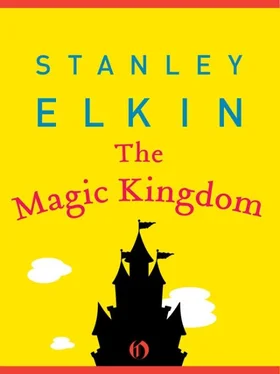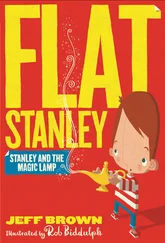“Oh, Jesus,” he said. “It’s the wiseacre.”
Benny Maxine was talking to the media.
“After all this excitement, what’s the first thing you mean to do when you get on that plane, Benny?”
“Hijack it to Monte Carlo. I’ve had an ’art-to-’art wif me mates an’ we’ve decided dat Florider is a nice ernuff place ter be if you’re a horange or a halligator, but Monte Carlo’s where de action is for poor blokes wot are last-flinging it an’ habout ter make deir mums an’ das orfinks, as ’twere. Der red an’ der black, Chemmy-de-fer an’ de nude beaches, dat’s de place fer us!” Benny Maxine said into their television cameras.
“You really mean to hijack that seven forty-seven, Benny?”
“You de bloke from de Times?”
“Evening Standard.”
“I want ter see de Times chap. De Queen takes de Times.”
“I’m from the Times.”
“Tell der Queen we’re Englitchmen, loyal subjects one an’ all. Tell ’er we go where we’re sent. Tell ’em in Piccadilly, tell ’em in Leicester Square. Tell ’em on de playink fields de lent’ an’ bret’ uh dis great kingdom. We’re nought but poor terminal yunsters wot may be dying an’ all, but true blue Englitch for all dat. Hip hip, haw haw!”
They stared at him.
“Too much?” Benny asked in his own voice.
Benny abandoned, the press off to take down the views of the more solemnly sick, getting Janet Order’s blue opinions, Noah Cloth’s amputate pearls, Rena Morgan’s sob story, the wit and wisdom of Lydia Conscience and Charles Mudd-Gaddis and Tony Word.
“I make the best copy,” Benny Maxine sulked to Bale. “I’m the character here.”
“It isn’t a contest, Benny,” Eddy consoled. “Don’t push so hard.”
“Jimmy Cagney,” Benny Maxine said. “I want to go out like those guys they used to send down that last mile to the chair. Chewing gum, cracking jokes. ‘I know what you’re up to, Fadda. You’re a good Joe, but you’re wasting your time. I guess I’m just this bad hardboiled egg, Fadda.’”
“Come on, Benny.”
“I’m fifteen years old, Mr. Bale. Those other kids. Some of them are sicker than I am, but I don’t think it’s hit them yet. What’s what. How they’ve been kissed off by God and medical science both. The nits are actually excited.”
“Listen, Benny, don’t get the idea you’re here to set anyone straight. There’s no timetable. It ain’t British Rail. Leave them alone with your inside information.”
And filling in the nanny, Nedra Carp, about Benny: “Use the spurs on that one, Miss Carp. He wants to tell ghost stories.”
“Call me Nanny,” Nedra Carp said. “Prince Philip called me Nanny. Her Highness did.”
And Mr. Moorhead, who advised him that Ben was very likely in a manic phase just now and that they could expect a reactive depression to follow. Telling Eddy that while there wasn’t much he could do medically for the child at this point, if his symptoms became more focused they could take certain steps. “Jesus,” Bale said. “He’s manic depressive too?”
“We can handle it. If he gets really low,” said the physician, “I’ve some reds I can give him.”
“Reds,” Eddy said.
“Sure,” the good doctor said, “and if he climbs too high we can put him on blues.”
“Reds and blues,” Eddy Bale said, staring at the medical man.
“Uppers and downers, Eddy,” the doctor explained scientifically. “This could all have been avoided if we’d had extensive psychological profiles on these kids. Though it just might help if we kept him off sweets.”
Eddy Bale thought of Benny Maxine’s hi-cal fingernails.
Because the last-minute hitches were something more than the odd mislaid passport or their friends crowding round to see them off, their relatives’ helpful hints, special-pleading the kids’ tics and habits that they chose only at this last minute to disclose to Eddy, Eddy’s staff, Eddy taking notes and going into a furious, extemporized version of a shorthand he would not later be entirely able to decipher, offering the benefit of their close, habituate knowledge, their eight- to fifteen-year-old front-line observation of their offspring, filling them in — even the hostesses, even the stewards, the pilot, the crew of the 747 who had come out to look at their special passengers — on everything they could think of, as if the children were temperamental doors that only they knew how to open, cars difficult to start unless you knew just how to turn the ignition — Eddy furiously writing, writing — or houses leased for a season to strangers, pressing on them, too, medications that would have to be chilled, chipped toys, broken dolls, scraps of blanket, swatches of garment: all the emergency rations of a crisis comfort. (Exactly as if they were mechanical, their disorders trying as someone else’s machinery.) Or even the crush of the press. Not hitches, not even helpful hints, so much as a series of charms and spells. And Eddy trying to keep up, to get it all down. The real hitches his queer staff. Only Colin Bible quietly coping. Only Mary Cottle serene. The kids themselves in palace revolt, bloodless coup. Not noisy — they wouldn’t be noisy children, giving loudness only to their pain, the klaxon fortissimos of alarm — but moving along vaguely forbidden routes, doing the water fountains excessively, the lever- operated ashtrays, the now dismantled television equipment, the mikes and lights, watching the planes land, pointing, their eyes peeled for catastrophe. The real hitch his staff, his caper- dreamed crew. (Bale taking notes furiously, abbreviating, jotting, underscoring, placing exclamation points like unsheathed daggers beside main points he would later puzzle over, wondering what they could possibly mean.)
Out of the side of Bale’s mouth: “Get on them, please, Nanny.”
“At once, sir,” Nedra agreed, and Bale, even out of just the corner of his eye and even with only half an ear cocked and only a fraction of his already divided attentions, could tell at once the enormity of his mistake. She was solicitous and intimidated, her months with Prince Andrew no plus at all, a season of watered, undermined authority. (He should have demanded references from Her Majesty.) Eddy saw her for what she was, more nursemaid than nanny, a tucker-inner, a pusher of perambulators and strollers, protective enough but incapable of anything but loyalty, by nature a fan, for Labor, he guessed, when Labor was in, a Tory under the Tories, on all Authority’s impressive tit, effaced, invisible as a poor relation or maiden aunty. Wouldn’t the children be happier in the airport’s lovely, comfortable seats? she wondered. Would they like to look at some of our nation’s lovely newspapers travelers were forever leaving behind? Perhaps a few of the bigger children could read some of the smaller children the news?
“Was that a crack?” Charles Mudd-Gaddis snarled.
“Of course not, Charles,” Nedra Carp said. “I’m sorry if you took it that way.”
“I may only be eight years old and three feet tall,” he sneered, “and weigh only thirty-nine pounds, but I’m not ‘some of the smaller children.’”
“Of course not.”
“I’ve got progeria,” he said bitterly.
“Yes.”
“It’s a condition,” he grumbled.
“I know.”
“It ages me prematurely,” he complained.
“Tch-tch.”
“It shrivels me up like a little old man,” he groused sullenly.
“Of course it does,” she said, and looked around desperately, studying Heathrow’s lovely lever-operated ashtrays should she be taken ill.
“It wrinkles my skin and hardens my arteries and causes my hair to fall out,” he whined.
Читать дальше












